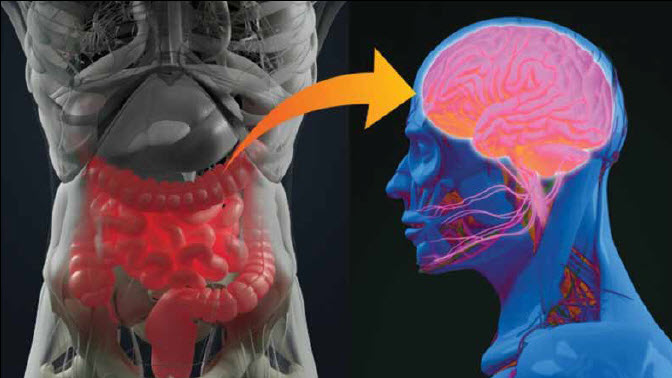Rewiring Your Second Brain – Mental Health Minute
 By: Lisa Philippart
By: Lisa Philippart
In my last article, we discussed the gut-brain connection. I asked you to at least consider that there is a connection between inflammation in the gut and symptoms of mental illness. I am not a dietician nor a nutritionist, but if you are willing to go with me and take this relationship a step further, we may be able to find ways to cultivate good gut bacteria to reduce depression and other mental health challenges. Changes in what you put in your body can lead to healthier mental and emotional states. And this can now be verified by empirical research and data.

Antibiotic Use: Regular antibiotic use can kill the diverse microbiota in the gut. Antibiotics can’t discern between which bacteria is beneficial for our health and which is not; and overuse can affect long-term health. For example, a connection has been made between inflammatory bowel disease (IBD,) which may be a result of a permanent change in microbiota, and depression. Probiotics: In 2013, a microbiologist in California discovered that mice with some autistic features had lower levels of a common gut bacterium (bacteriodes fragilis) than “normal” mice. These mice were stressed, antisocial, and had gastrointestinal issues. When the scientists fed the mice a probiotic (B. fragilis), the symptoms reversed. In a 2015 study, researchers in the Netherlands discovered that in a four-week study, participants receiving multispecies probiotics showed reduced rumination and aggressive thoughts as a result of a reduction in sadness. Fermented foods: Fermented food is the best kind of probiotic you can feed your gut. These foods contain a broad combinations of microbes, so your chances are better that you will get some useful bacteria. One of the easiest, most common fermented foods is yogurt. FF are recommended for improvement in overall symptoms including depression, anxiety, brain fog, hormonal issues, and fatigue.

Here’s the Dirt: Are you obsessed with using hand sanitizers? (I’ll admit I have to work on this one.) Did you know that overuse of sanitization may be making us sick? Over-sanitizing can kill all bacteria, including the good kind. Scientists have been researching why children who grow up in homes with a dog have a lower risk of developing allergies. Turns out dog ownership is associated with a kind of house dust that exposes us to important strains of good bacteria. Additionally, the soil brought into our homes has wonderful healing elements that can boost our immune systems. Sugar and Processed Food: A diet high in sugar causes changes in the gut bacteria. In an Oregon State University study of mice with a high-sugar diet, it was discovered that cognitive flexibility was impaired. This impairment means that the mice experienced difficulty in adjusting to changing situations. Additionally, the high-sugar diet negatively affected the mice’s long-term and short-term memories. Plants and Fiber: By eating more plants, we are able to achieve and maintain microbiota diversity in our gut systems. This, by extension, would lead to a clearer mind and happier disposition. The gut microbes are kept busy feasting on fiber which keeps the intestinal lining intact, unlike the sugars that starve the gut bugs so that they nibble on the mucous lining of our intestines. Changing one’s diet transforms gut bacteria, which leads to happier and healthier mind, body, and spirit. Red Meat: In April 2013, a Harvard study compared the effects of extreme diets on nine participants. The first diet consisted of meat and cheese; the second diet was fiber-rich consisting of only foods from plants. The scientists tracked changes in the microbiomes and discovered that on the animal diet, the bacteria in the gut produced more Bilophila, which has been found to cause inflammation and intestinal diseases. After about three days on the animal diet, the volunteers’ behavior began to be affected by the change in microbiota.
Let me add one more lifestyle change suggestion that can have an enormous positive effect on your gut health. Lower Stress: When you feel stressed, your body discharges natural steroids and adrenaline, triggering your immune system to release inflammatory proteins. (This happens whether the threat is real or imagined.) Your intestinal bacteria and immune-response system work very closely together to remove possible diseases or foreign agents. Chronic immune response weakens the health of your gut leading to unbalanced microbiomes which causes all kinds of diseases, such as Crohn’s disease and IBD. Does lowering stress lead to a healthy gut, or does a healthy gut lead to lower stress? Does it really matter? Literally, food for thought…
By: Lisa Philippart, Licensed Professional Counselor